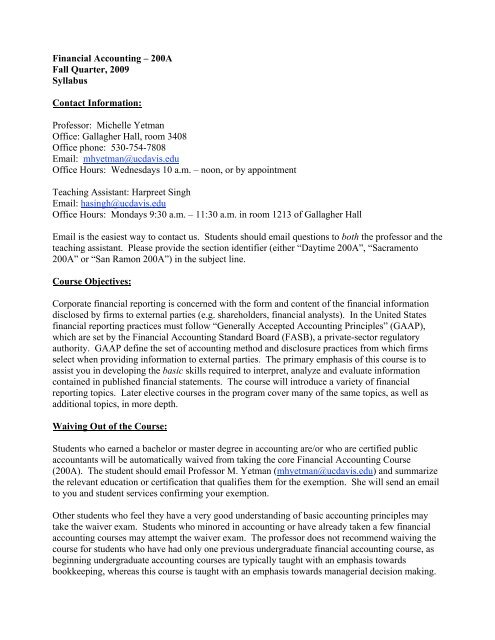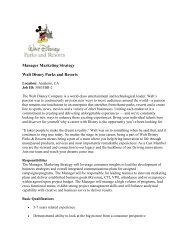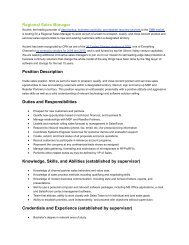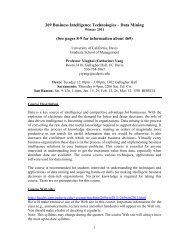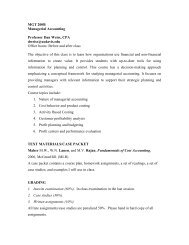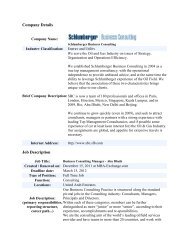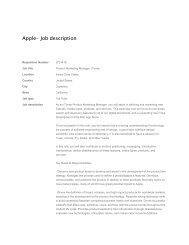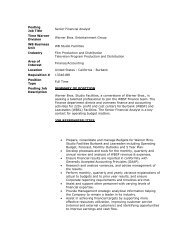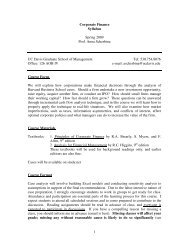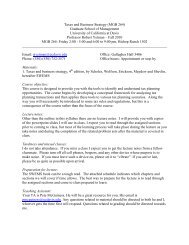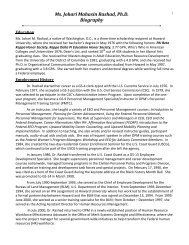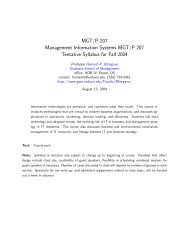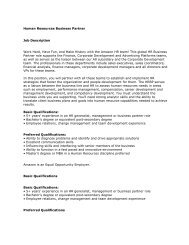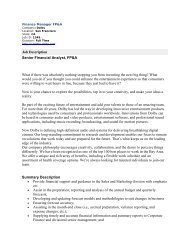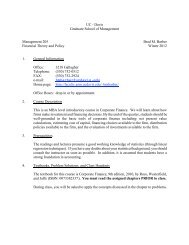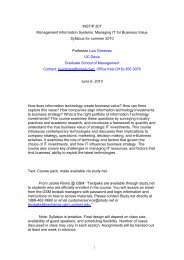Financial Accounting â 200A Fall Quarter, 2009 Syllabus ... - Students
Financial Accounting â 200A Fall Quarter, 2009 Syllabus ... - Students
Financial Accounting â 200A Fall Quarter, 2009 Syllabus ... - Students
Create successful ePaper yourself
Turn your PDF publications into a flip-book with our unique Google optimized e-Paper software.
<strong>Financial</strong> <strong>Accounting</strong> – <strong>200A</strong><br />
<strong>Fall</strong> <strong>Quarter</strong>, <strong>2009</strong><br />
<strong>Syllabus</strong><br />
Contact Information:<br />
Professor: Michelle Yetman<br />
Office: Gallagher Hall, room 3408<br />
Office phone: 530-754-7808<br />
Email: mhyetman@ucdavis.edu<br />
Office Hours: Wednesdays 10 a.m. – noon, or by appointment<br />
Teaching Assistant: Harpreet Singh<br />
Email: hasingh@ucdavis.edu<br />
Office Hours: Mondays 9:30 a.m. – 11:30 a.m. in room 1213 of Gallagher Hall<br />
Email is the easiest way to contact us. <strong>Students</strong> should email questions to both the professor and the<br />
teaching assistant. Please provide the section identifier (either “Daytime <strong>200A</strong>”, “Sacramento<br />
<strong>200A</strong>” or “San Ramon <strong>200A</strong>”) in the subject line.<br />
Course Objectives:<br />
Corporate financial reporting is concerned with the form and content of the financial information<br />
disclosed by firms to external parties (e.g. shareholders, financial analysts). In the United States<br />
financial reporting practices must follow “Generally Accepted <strong>Accounting</strong> Principles” (GAAP),<br />
which are set by the <strong>Financial</strong> <strong>Accounting</strong> Standard Board (FASB), a private-sector regulatory<br />
authority. GAAP define the set of accounting method and disclosure practices from which firms<br />
select when providing information to external parties. The primary emphasis of this course is to<br />
assist you in developing the basic skills required to interpret, analyze and evaluate information<br />
contained in published financial statements. The course will introduce a variety of financial<br />
reporting topics. Later elective courses in the program cover many of the same topics, as well as<br />
additional topics, in more depth.<br />
Waiving Out of the Course:<br />
<strong>Students</strong> who earned a bachelor or master degree in accounting are/or who are certified public<br />
accountants will be automatically waived from taking the core <strong>Financial</strong> <strong>Accounting</strong> Course<br />
(<strong>200A</strong>). The student should email Professor M. Yetman (mhyetman@ucdavis.edu) and summarize<br />
the relevant education or certification that qualifies them for the exemption. She will send an email<br />
to you and student services confirming your exemption.<br />
Other students who feel they have a very good understanding of basic accounting principles may<br />
take the waiver exam. <strong>Students</strong> who minored in accounting or have already taken a few financial<br />
accounting courses may attempt the waiver exam. The professor does not recommend waiving the<br />
course for students who have had only one previous undergraduate financial accounting course, as<br />
beginning undergraduate accounting courses are typically taught with an emphasis towards<br />
bookkeeping, whereas this course is taught with an emphasis towards managerial decision making.
Class Materials:<br />
Textbook: <strong>Financial</strong> <strong>Accounting</strong> for MBAs, 4th edition by Easton, Wild, Halsey, McAnally.<br />
ISBN: 978-1-934319-34-5. There are many changes between the 3 rd and 4 th editions (including<br />
many of the end of chapter exercises and problems), so I urge you to obtain the 4 th edition.<br />
Additional Materials:<br />
• Course Cases are provided on study.net. Instructions to accessing study.net are in<br />
SmartSite under “Resources,” “Instructions for Accessing Study.net.” If you have problems<br />
accessing the cases on study.net, contact Instructional Resources at the Graduate School of<br />
Management at instructional@gsm.ucdavis.edu or study.net directly. Other case<br />
information will be posted on SmartSite under “Resourses,” “Cases”.<br />
• Class notes will be provided on SmartSite under “Resources,” “Class Notes” at least 24<br />
hours before class. Note that electronic copies of the class notes are not a substitute for the<br />
material covered in class. They are a base set of notes to assist you in note taking during<br />
class.<br />
• Solutions to most of the textbook problems are posted on SmartSite under “Resources,”<br />
“Textbook Solutions.”<br />
Class Format:<br />
You are expected to have read the textbook material and attempted the textbook assignment prior to<br />
coming to class. Although you are responsible for all questions, exercises, and problems assigned, I<br />
will cover only the more challenging ones in class. The class format is a lecture that highlights key<br />
conceptual issues followed by working select problems and cases.<br />
Attendance:<br />
I do not take attendance. However, attending class is valuable in helping you understand the<br />
material; therefore I suggest you attend class. If you do need to miss class, you will need to rely on<br />
a classmate for any notes taken in class. I am happy to answer questions about the material, but<br />
only after you attempt to work through it yourself. One issue with respect to missing class is with<br />
respect to case assignments and exams. Please see “Assessment and Exam Policy” below in terms<br />
of the policy on turning in case assignments and taking exams.<br />
If you know you will be missing a class and would like to attend an alternative section, you may<br />
email me to request to attend one of my other classes. The attached schedule outlines the topics that<br />
I plan to cover on each date. However, I cannot guarantee that the timing of the lectures will be<br />
perfectly synchronized across the sections.<br />
Classroom Etiquette:<br />
Please do your best to arrive in time. I realize that circumstances may occur where you may be late<br />
to class. Please feel free to join the class late, but enter quietly and try to minimize disruption to the<br />
class. Also, please turn your cell phone off during class. If you must have your cell phone on<br />
during class then please turn it on vibrate and sit in an area of the class room where you can<br />
minimize disturbance should you need to leave the room to take a call. Finally, please be respectful<br />
to all of your classmates and do not talk to your neighbors during class.<br />
2
Performing well in the course:<br />
This course does not require a prerequisite and will be taught assuming no prior knowledge of<br />
accounting. Because this is a master’s course we move – the material quickly. This gives you little<br />
time to digest the material before we move on. Not understanding the material in early chapters<br />
will prevent the understanding of material in later chapters since the accounting concepts build on<br />
each other. Thus, many students will be inclined to get lost quickly unless they keep up and invest<br />
in understanding each concept as it is covered. If you find yourself getting behind, I strongly<br />
suggest that you find time to study. If you are confused, you need to see me for help (but only after<br />
you attempt to understand the material on your own). With this in mind, before the first class I<br />
strongly encourage you to read modules 1-3 and attempt the textbook assignment (solutions are<br />
posted on SmartSite). I don’t expect you to fully understand the assignment, but if you read the<br />
modules and attempt the assignment, things will become clearer to you in the lecture.<br />
Assessment and Exam Policy:<br />
Item<br />
Percent of Final Grade<br />
Case Assignments (4 equally weighted) 20%<br />
Exam 1 (Modules 1-4) 30%<br />
Exam 2 (Modules 1-8) 30%<br />
Final Exam (Comprehensive) 20%<br />
You are expected to take the exams at the scheduled time. If you must miss an exam, then please<br />
contact the professor as far in advance as possible to make alternative arrangements. With the<br />
exceptions of emergencies, failure to contact the professor about missing an exam will result in a<br />
score of 0 on the item<br />
The content of the exams will be derived from the textbook readings, textbook assignments, case<br />
assignments, class notes, and any problems covered in class. You are responsible for understanding<br />
all of the assignments regardless of whether we covered them in class (detailed solutions of all of<br />
the assignments will be posted on the course website). Case solutions will not be posted on the<br />
website, but we will review them in class.<br />
Case assignments are due at the beginning of class. For East Bay classes, students in both sections<br />
must turn in their case assignments by the beginning of the first class on the due date. If you are<br />
going to miss class on a day when a case is due, you may email it to me, but it must be in my inbox<br />
before class begins and it must be in PDF format. Late assignments will not be accepted.<br />
Requests for regrading must be made in writing within two weeks from the return of the graded<br />
item. My grader and I may regrade the entire item and, therefore regrading may result in a higher or<br />
lower score.<br />
3
Schedule (subject to change):<br />
Daytime: Tuesday from 9 am – 11:50 in Gallagher Hall, room 1213.<br />
Sacramento: Tuesday from 6 – 9 pm in OCM, room 1.<br />
East Bay Section 1: Friday from 2 – 5 pm and Saturday from 9 am – noon in Bishop Ranch, room 1501.<br />
East Bay Section 2: Friday from 6 – 9 pm and Saturday from 1 – 4 pm in Bishop Ranch, room 1501.<br />
Directions to locations: http://www.gsm.ucdavis.edu/ExploreOurSchool/index.aspx?id=188&m2=99&m3=4&m1=94<br />
Note: Class notes will be posted on the course website at least 24 hours before class. There is no need for you to review them before<br />
class, but you may want to either print them or download them onto your computer to assist in note taking during class.<br />
Daytime<br />
and<br />
Sacramento<br />
Sept 29<br />
and<br />
Oct 6<br />
East Bay Module Topic<br />
Fri Sept 25<br />
and<br />
Sat Sept 26<br />
1<br />
2<br />
3<br />
<strong>Financial</strong> <strong>Accounting</strong><br />
for MBAs<br />
Introducing <strong>Financial</strong><br />
Statements and<br />
Transaction Analysis<br />
Constructing <strong>Financial</strong><br />
Statements and<br />
Analyzing Transactions<br />
(only part of chapter)<br />
Assignments<br />
(to be turned in)<br />
and Exam Dates<br />
Textbook Assignment<br />
(do not turn in)<br />
(Solutions on SmartSite under<br />
“Resources,” “Textbook Solutions”)<br />
• Read Module 1<br />
• Skim Appendixes 1A & 1B,<br />
• Q1-1 – 1-8, Q1-15 – Q1-18, E1-28, E1-30,<br />
E1-34, P1-36, P1-39, P1-44<br />
• Read Module 2<br />
• Skim Appendix 2A<br />
Q2-1 – Q2-18, M2-21, M2-23, E2-27, E2-<br />
35, P2-41, P2-43, P2-45, P2-46, P2-48<br />
• Read Module 3, but ignore the discussions<br />
on t-accounts and journal entries. We will<br />
record transactions only in the financial<br />
statement template and NOT in t-accounts<br />
or journal entry form. Also ignore<br />
discussion on Trial Balance.<br />
• Ignore Appendix 3A.<br />
• Q3-1, Q3-7, Q3-9, Q3-10, E3-28, E3-33,<br />
E3-36, P3-39, P3-41, P3-44, P3-45b,<br />
P3-47b<br />
4
Daytime<br />
and<br />
Sacramento<br />
Oct 13 Fri Oct 9<br />
East Bay Module Topic<br />
Oct 20 Sat Oct 10 5<br />
3<br />
4<br />
Constructing <strong>Financial</strong><br />
Statements and<br />
Analyzing Transactions<br />
Analyzing and<br />
Interpreting <strong>Financial</strong><br />
Statements<br />
Reporting and<br />
Analyzing Operating<br />
Income<br />
Assignments<br />
(to be turned in)<br />
and Exam Dates<br />
Case 1: Lost Peak<br />
Winery, Inc. (A)<br />
• Case is provided on<br />
study.net<br />
• Additional case<br />
information will be<br />
posted under<br />
“Cases” in<br />
SmartSite as<br />
Case1.pdf<br />
• Due at the<br />
beginning of class<br />
(East Bay students<br />
must turn in case<br />
by 9 am on<br />
Saturday)<br />
• Bring 2 copies of<br />
your case solutions<br />
(one to turn in and<br />
one to use while we<br />
review the solution<br />
in class)<br />
Textbook Assignment<br />
(do not turn in)<br />
(Solutions on SmartSite)<br />
Continued from last assignment.<br />
• Read Module 4 and appendices<br />
• Q4-1–4-14, M4-15, M4-16, M4-17,<br />
E4-25, P4-39, P4-40, P4-41, P4-47,<br />
P4-48<br />
Read these sections of Module 5<br />
• Revenue and its Recognition (5-1 –<br />
5-11). No need to memorize the cases<br />
on 5-7 and 5-8 or how to calculate<br />
percentage of completion revenue, but<br />
be aware of the concepts.<br />
• Research and Development (R&D)<br />
expenses (5-11 – 5-14)<br />
• Restructuring Expenses and<br />
Incentives (5-14 – 5-16)<br />
• Income Tax Expenses and<br />
Allowances (5-17 – 5-24, plus<br />
appendix 5A)<br />
• Extraordinary Items (5-26 – 5-27)<br />
Skim these sections of Module 5<br />
• Foreign Currency Translation Effects<br />
(5-24 – 5-25)<br />
• Earnings Per Share (5-27 – 5-29)<br />
Q5-1, Q5-2, Q5-3, Q5-6, Q5-7, Q5-8, Q5-<br />
10, M5-15, M5-21, E5-22, E5-23, E5-26,<br />
E5-30, E5-32, P5-41<br />
5
Daytime and<br />
Sacramento<br />
East Bay Module Topic<br />
Oct 27 Fri Oct 23 5<br />
Nov 3 Sat Oct 24 6<br />
Nov 10 Fri Nov 6 8<br />
Nov 17 Sat Nov 7 8<br />
Reporting and<br />
Analyzing Operating<br />
Assets<br />
Reporting and<br />
Analyzing Nonowner<br />
Financing<br />
Reporting and<br />
Analyzing Nonowner<br />
Financing<br />
Assignments<br />
(to be turned in)<br />
and Exam Dates<br />
Exam 1<br />
• Covers Modules 1 – 4<br />
• Additional exam information will be<br />
posted under “Exams” in SmartSite<br />
as Exam1.pdf<br />
Case 2: Merrimack Tractors and<br />
Mowers, Inc.: LIFO or FIFO?<br />
• Case is provided on study.net<br />
• Case questions will be posted under<br />
“Cases” in SmartSite as Case4.pdf<br />
• Due at the beginning of class (East<br />
Bay students must turn in cases by 2<br />
pm on Friday)<br />
• Bring 2 copies of your case<br />
solutions<br />
Case 3: Depreciation Policy: British<br />
Airways Versus Lufthansa<br />
• Case is provided on study.net<br />
• Case questions will be posted under<br />
“Cases” in SmartSite as Case3.pdf<br />
• Due at the beginning of class (East<br />
Bay students must turn in cases by 9<br />
am on Saturday)<br />
• Bring 2 copies of your case<br />
solutions<br />
Textbook Assignment<br />
(do not turn in)<br />
(Solutions on SmartSite)<br />
• Read Module 6<br />
• Q6-1 – Q6-11, E6-22,<br />
E6-24, E6-27, E6-30,<br />
E6-32, E6-37, P6-41,<br />
P6-42<br />
• Read Module 8<br />
• Q8-1 – Q8-6, E8-23,<br />
E8-24, E8-28, E8-30,<br />
E8-31, E8-32, P8-37<br />
Continued from last<br />
assignment.<br />
6
Daytime and<br />
Sacramento<br />
Nov 24 Fri Nov 20<br />
East Bay Module Topic<br />
Dec 1 Sat Nov 21 B<br />
Dec 8 during<br />
regular class<br />
time<br />
To Be<br />
Announced<br />
Appendix B<br />
Constructing the<br />
Statement of Cash<br />
Flows<br />
Assignments<br />
(to be turned in)<br />
and Exam Dates<br />
Exam 2<br />
• Covers Modules 1 – 6 + 8 (with<br />
heavy emphasis on 5, 6, & 8)<br />
• Additional exam information will be<br />
posted under “Exams” in SmartSite<br />
as Exam2.pdf<br />
Case 4: To be announced<br />
• Case will be posted under “Cases”<br />
in SmartSite as Case4.pdf (not<br />
study.net).<br />
• Due at the beginning of class (East<br />
Bay students must turn in cases by 9<br />
am on Saturday)<br />
• Bring 2 copies of your case<br />
solutions<br />
Final Exam<br />
• Comprehensive<br />
• Additional exam information will be<br />
posted under “Exams” in SmartSite<br />
as Final.pdf<br />
Textbook Assignment<br />
(do not turn in)<br />
(Solutions on SmartSite)<br />
• Read Appendix B and<br />
B1<br />
• QB-1 – QB-21,<br />
PB-39, PB-44, PB-47<br />
7


